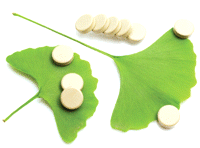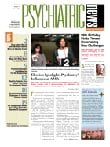One of the most popular natural products sold in the United States these days is ginkgo biloba, an extract from the leaves of the ginkgo biloba tree (Psychiatric News, January 15, 2010). Ginkgo biloba has been shown to improve the attention, memory, and cognitive speed of some cognitively healthy subjects. However, a well-powered long-term clinical trial did not find ginkgo biloba to be effective in preventing or delaying the onset of Alzheimer's disease (Psychiatric News, January 2, 2009).
New data indicate, however, that ginkgo biloba may have benefits in treating tardive dyskinesia—an involuntary repetitive movement disorder that can result from the long-term use of typical antipsychotic medications and sometimes from the long-term use of atypical ones.
The finding was reported in the May Journal of Clinical Psychiatry by a team of Chinese researchers headed by Dong-Feng Zhou, M.D., of Peking University's Institute of Mental Health.
Since damaging molecules called free radicals may be involved in the pathogenesis of tardive dyskinesia, and since ginkgo biloba is known to be a potent antioxidant possessing the ability to neutralize free radicals, Zhou and his colleagues decided to conduct a randomized, double-blind, placebo-controlled trial to see whether ginkgo biloba might be an effective treatment/preventative for tardive dyskinesia.
One hundred-and-fifty-seven inpatients with DSM-IV–diagnosed schizophrenia and tardive dyskinesia in Chinese psychiatric hospitals were randomly assigned to 12 weeks of treatment with a standardized extract of ginkgo biloba at 240 mg/day or a placebo in a double-blind manner.
The primary outcome measure was a change from baseline in the Abnormal Involuntary Movement Scale (AIMS). Subjects with a 30 percent or more reduction in their AIMS score at week 12 were considered responders. Secondary outcome measures included Positive and Negative Syndrome Scale (PANSS) score and cognitive performance as measured by the Continuous Performance Test-37 Version and the three-card Stroop task.
Of the 157 subjects, 97 percent completed the study. The AIMS scores of ginkgo biloba subjects were significantly lower at weeks 6 and 12 than the AIMS scores of the placebo subjects. Moreover, 51 percent of the ginkgo biloba subjects, but only 5 percent of the placebo subjects, were found to be responders. There were no between-group differences in the PANSS outcomes or cognitive outcomes from baseline to week 12.
Thus, while the results showed no beneficial effect of ginkgo biloba on positive or negative symptoms or cognitive function, they did demonstrate a beneficial effect on tardive dyskinesia. And "not only was a positive effect observed during treatment, but there was also a carryover effect for at least six months after the medication had been discontinued," Zhou and his colleagues noted. Thus, "the potential usefulness of the [ginkgo biloba] extract in the treatment of tardive dyskinesia has clinical importance, as it has only rare and transitory side effects in relatively high doses."
Commenting on the study for Psychiatric News, Alice Flaherty, M.D., Ph.D., an assistant professor of neurology at Harvard Medical School and the Movement Disorders Fellowship director at Massachusetts General Hospital, said the results are encouraging, "[But] doctors and patients should be aware that commercially available ginkgo pills are often sold by gram of herb, and the percentage of ginkgo biloba extract can vary dramatically. [Also] the average AIMS scores of the patients were not dramatic. The group average at start was 7 out of a maximum of 42, and on average their scores fell only 2 points. [Thus] the drug might make a cosmetic improvement, but few if any patients had complete removal of their symptoms."
"This is an interesting study demonstrating the efficacy of ginkgo biloba extract in reducing symptoms of tardive dyskinesia," Gunvant Thaker, M.D., a professor of psychiatry at the University of Maryland and a schizophrenia expert, told Psychiatric News. "The study had several strengths: participants were treated long enough (three months) with the experimental drug to adequately gauge its effects, there was a six-month follow-up period, and the sample size was reasonably large. One of the weaknesses of the study was that most participants were receiving clozapine, raising the question of whether the findings can be extended to patients on other antipsychotic agents. Also, the study did not report on how long the experimental group was treated with clozapine compared to the placebo group. This is important because long-term treatment with clozapine has been shown to reduce dyskinesia.... Regardless, the findings are encouraging for a disorder that remains highly prevalent worldwide and where there are few effective treatments."
The study was funded by the National Basic Research Program of China and the National Natural Science Foundation of China.

